Markets React to the Eurozone's Latest Bailout Fiasco

Cyprus is the latest country facing a bailout in the eurozone crisis, with the European Union and International Monetary Fund both saying that a bailout will be conditional on a bank levy paid for by those with savings in Cypriot banks Cypriot taxpayers. European bank officials have said that they will allow for some flexibility regarding the plan, but that $7.6 billion must be raised whatever rates the Cypriot government decides on. An emergency vote on the bailout plan has been delayed and will be held on Tuesday evening.
Markets were unsurprisingly shaken by the latest developments in Cyprus, a country that (as Cato's Dan Mitchell has pointed out) has a GDP smaller than Vermont's.
Many European leaders had hoped to put the euro crisis behind them, but the latest news from Cyprus is the most recent sign that the euro-crisis is not over yet.
There have been understandable public demonstrations against the levy plan, which would require those with savings accounts in Cypriot banks to contribute. The BBC has provided an infographic detailing how these contributions would work:

The BBC reports that the president may want these rates lowered.
In order to stop what could become a major run on the banks the Cypriot government has closed banks until Thursday. Unlike other bailouts in the eurozone the bailout in Cyprus could see the government take people's savings directly rather than taking it through quantitative easing, which will not reassure those in Spain and Italy, two other countries that are hardly in an ideal economic position.
Update: The above text has been altered to reflect that the bank levy would be paid by those with savings in Cypriot banks rather than Cypriot taxpayers


Show Comments (162)